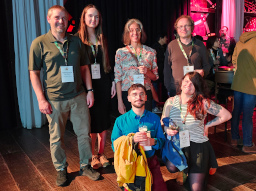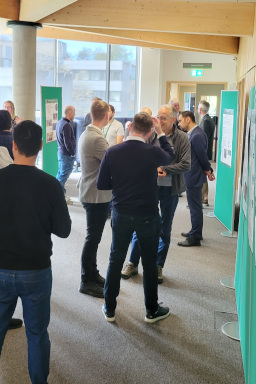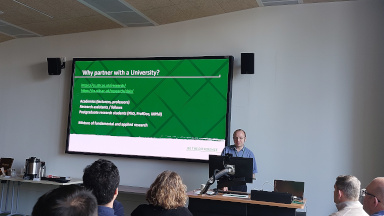Computing Science and Mathematics Research
Data science And Intelligent Systems (DAIS)
About | News | Members, Expertise and Applications | Projects and Publications
The Data science And Intelligent Systems (DAIS) Research Group are a group of academics, researchers and PhD students within the Division of Computing Science and Mathematics at the University of Stirling. We are interested in the development, theory, and application of data-driven methods to understand, model and optimise the world.
Data is all around us, and humanity generates over 2 quintillion bytes (that’s a 2 followed by 18 zeroes) of new data every day. Cutting-edge techniques are able to make sense of this data and explore it for the greater good. DAIS researchers have embraced data to: inform healthcare decisions through modern statistical analysis; assist those with impairments communicate, using machine learning algorithms to spot c at the momenomplex patterns in sound and brain patterns; predict outcomes of complex systems, with intelligent models that explain their decisions so that they can be trusted; perceive the world through computer vision to assist with sight loss and monitor our environment from space; schedule planes to arrive on time and design buildings to be more comfortable and energy efficient through advanced optimisation methods; and understand how all these techniques work and fit together using novel visualisations methods. These are just some of the areas where our group is advancing knowledge.
We are always happy to talk to companies and other academics about how we might work together. In the first instance please contact Dr Sandy Brownlee (alexander.brownlee@stir.ac.uk), DAIS group leader.
News
March 2025: Visitors
This month we welcome Piotr Lipinski and his PhD student Klaudia Balcer, from the University of Wroclaw. They are working with Sandy Brownlee and Giancarlo Catalano on explainability techniques in machine learning and optimisation.
December 2024: British Academy grant success
Congratulations go to Dr Yuanlin Gu, who has just started a British Academy funded project "Market Reactions to Managers' Accents in Earnings Conference Calls: a Machine Learning Approach". This is a collaboration between Stirling, St Andrews, and Birmingham, led by St Andrews. Stirling's role is to extract linguistic features from earnings calls and explore their impact on market responses. You can find more detail here.
November 2024: PhD recruitment, and Paper
Dr Ahsan Adeel is currently recruiting PhD students (closing date 19 November 2024), under the ARIA funded TREND project. See here for more details. Dr Sandy Brownlee has a paper published in Automated Software Engineering journal, "Large Language Model Based Mutations in Genetic Improvement". A preprint can be found here. This month Dr Brownlee and Dr Leonardo Bezerra participated in the public launch of PHAWM with some very useful interdisiplinary networking and interesting discussions. They were also delighted to join the discussions on AI and automation at an event organised by Stirling's social science faculty, and look forward to ongoing exploration of the social issues in this area.
September 2024: Conference, Papers, and Another Welcome
This month Prof Gabriela Ochoa attended PPSN in Austria, having co-authored four papers there. Dr Sandy Brownlee's co-authored survey paper "Evolutionary Computation and Explainable AI: A Roadmap to Transparent Intelligent Systems" has just been accepted to IEEE Transactions on Evolutionary Computation. A preprint can be found on ArXiv. We also welcome Jakub Konopka, who is starting a PhD under Jason Adair's supervision, looking at Optimising food growth in a Living lab environment. This is part of the University's Net Zero Communities cluster.
July 2024: Conferences, Welcomes, and Farewells
 In July Prof Gabriela Ochoa, Dr Sandy Brownlee, Dr Saemundur Haraldsson, Giancarlo Catalano, and Gudny Saemundsdottir travelled to Melbourne to attend the Genetic and Evolutionary Computation Conference (GECCO), the top conference in evolutionary computation. Gudny has just finished first year of her BSc Computing Science and was presenting a research project investigating generative AI and source code, "Large Language Models as All-in-one Operators for Genetic Improvement". Giancarlo also presented his first paper on MPhil work in explainable optimisation, "Mining Potentially Explanatory Patterns via Partial Solutions". In addition to several research presentations, Gabriela, Sandy and Saemi also chaired tutorials and workshops covering Landscape Aware Heuristic Search, Explainable AI, and Genetic Improvement of Software. Gabriela also chaired the Neuroevolution track and joined board meetings for SIGEVO, ECJ and TELO Journals.
In July Prof Gabriela Ochoa, Dr Sandy Brownlee, Dr Saemundur Haraldsson, Giancarlo Catalano, and Gudny Saemundsdottir travelled to Melbourne to attend the Genetic and Evolutionary Computation Conference (GECCO), the top conference in evolutionary computation. Gudny has just finished first year of her BSc Computing Science and was presenting a research project investigating generative AI and source code, "Large Language Models as All-in-one Operators for Genetic Improvement". Giancarlo also presented his first paper on MPhil work in explainable optimisation, "Mining Potentially Explanatory Patterns via Partial Solutions". In addition to several research presentations, Gabriela, Sandy and Saemi also chaired tutorials and workshops covering Landscape Aware Heuristic Search, Explainable AI, and Genetic Improvement of Software. Gabriela also chaired the Neuroevolution track and joined board meetings for SIGEVO, ECJ and TELO Journals.
Welcome to Dr Penny Johnston, who recently completed a PhD in Stirling and returns as a Research Fellow on the PHAWM project, working with Dr Sandy Brownlee and Dr Leonardo Bezerra. Farewell and thanks to Dr Keiller Nogueira, who is moving to the University of Liverpool: we wish him all the best in his new role.
May 2024: Industrial showcase, and Grant Success

 The DAIS group hosted an industrial engagement event on 26 April, organised by Dr Jason Adair and Dr Sandy Brownlee. The event included success stories of academic/industrial partnerships, funding opportunities, and a poster session with lots of time for discussions between academics and visitors around potential projects. There was a real buzz about the day: around 15 external organisations participated with several follow-up meetings planned. We look forward to seeing what new partnerships emerge!
The DAIS group hosted an industrial engagement event on 26 April, organised by Dr Jason Adair and Dr Sandy Brownlee. The event included success stories of academic/industrial partnerships, funding opportunities, and a poster session with lots of time for discussions between academics and visitors around potential projects. There was a real buzz about the day: around 15 external organisations participated with several follow-up meetings planned. We look forward to seeing what new partnerships emerge!
Dr Sandy Brownlee and Dr Leonardo Bezerra are pleased to share that they have been successful in winning a £410k grant from Responsible AI UK, part of the £3.5M project "Participatory Harm Auditing Workbenches and Methodologies" (PHAWM) being led by the University of Glasgow. Stirling's part is largely focused on exploring fairness and bias in machine learning algorithms. A full news story can be found here.
March 2024: Another viva success; and announcing our Industrial Showcase
Congratulations to Dr Stefano Sarti who passed his PhD viva with minor corrections this month. His thesis is entitled "Neuroevolution Trajectory Networks: Illuminating the Evolution of Artificial Neural Networks".
We would also like to announce our Industrial Showcase. Are you a business interested in benefiting from our cutting edge research in data science? We are holding a showcase day highlighting successful collaborations and how our expertise in machine learning, optimisation, and more can support you. Join us at the University of Stirling on Fri, 26 Apr 2024 10:00 - 13:30 to explore potential collaborations, funding & networking. Sign up here.
The Special Issue on Explainable AI in Evolutionary Computation on ACM Transactions on Evolutionary Learning and Optimization is finally online! This Special Issue collects four papers on the intersection between XAI and Evolutionary Computation, a growing field that still deserves more effort from the research community. Dr Sandy Brownlee is one of the guest editors on this issue.
January 2024: Viva success and more welcomes
Congratulations to Dr Penny Johnston who passed her PhD viva with minor corrections this month. Her thesis is entitled "Designing a Neuro-Symbolic Architecture for the Visual Question Answer Task".
We also welcome Dr Paulius Stankaitis and Dr Paul McMenemy as lecturers joining the group.
December 2023: Presentation
Dr Sandy Brownlee presented a paper on using large language models to automatically improve code at SSBSE 2023. This also attracted some media coverage here and here.
November 2023: More welcomes, and media coverage
This month we welcome Dr Vahid Akbari as a new lecturer. Vahid specialises in machine learning and earth observation technology and has previously worked within our Division as a postdoctoral research assistant. In other news, Dr Sandy Brownlee was recently interviewed about AI in Scotland. You can read the article here.
October 2023: Welcomes
Our department is currently growing and we are fortunate to have been joined by several new staff in recent weeks. Dr Ahsan Adeel brings experience of biologically plausible neural nets, and Dr Leonardo Bezerra has expertise in heuristic optimisation. You can see their keywords on our group members page. Welcome to both! We also look forward to more new staff joining during the next few months.

Computing Science and Mathematics
Faculty of Natural Sciences
University of Stirling
Stirling
FK9 4LA
Scotland
UK
